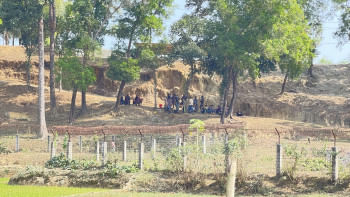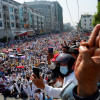High time for prompt, sensible diplomacy

As the situation in Myanmar continues to escalate, Bangladesh faces a number of challenges including that of national security. Against this backdrop, noted foreign affairs and security experts recently stressed that it is high time the government changed how it has been dealing with the situation so far. In a roundtable discussion organised by this daily on February 13, they said Bangladesh must engage in smart diplomacy and go for a multipronged approach to prevent any spillover into its territory, not to mention protect its own interests in the region.
As we have been seeing over the past few weeks, the renewed conflict between ethnic armed organisations (EAOs) in Myanmar and the military junta has been gaining momentum, with the latter increasingly losing ground. While any event of national interest in a neighbouring country deserves attention, what worries and frustrates us is Bangladesh's response to the conflict's spillover effects so far. People in the areas along the Bangladesh-Myanmar border have been living in constant fear as stray bullets and mortar shells routinely land on our side. Last week, two individuals were killed by a stray mortal shell in Bandarban. Over the past several days, at least 330 Myanmar troops and their families have fled into Bangladesh. There are legitimate concerns that we face risks of another large-scale influx of people displaced by the conflict.
In this situation, passive and reactive diplomatic efforts are no longer effective. As speakers at the roundtable have said, we must be proactive and smart. The government must engage with experts on national security, foreign policy, regional history and geopolitics who can analyse the situation in Myanmar as it unfolds, and recommend actions. The government should also engage with all stakeholders—from the EAOs, to the National Unity Government (NUG) in exile to the central government in Naypyidaw, to regional powers like China and India who have their own interests to protect in Myanmar.
Our interests should be conveyed to all parties involved, and we must be careful not to get involved in the play of other global and regional actors. At the same time, we must also be prepared to deal with potential armed offensives. As we have said before, our national interests and security must not be compromised under any circumstances. Smart diplomacy will help us achieve that.


 For all latest news, follow The Daily Star's Google News channel.
For all latest news, follow The Daily Star's Google News channel. 









Comments